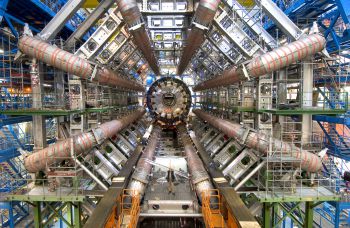University of Sussex scientists among winners of prestigious Breakthrough Prize in Fundamental Physics
By: Tom Latchem
Last updated: Wednesday, 9 April 2025

Photo credit: CERN (CC-BY-SA 4.0)
-
Prize highlights ATLAS Collaboration’s significant contributions to particle physics at CERN's Large Hadron Collider
-
Sussex has been at the forefront of ATLAS research since 2009, including contributing to the experiment’s ‘brain’
-
Sussex’s team of nineteen physicists and engineers heavily involved in preparing ATLAS for its next chapter
Scientists from the University of Sussex are among the thousands of researchers worldwide honoured with the 2025 Breakthrough Prize in Fundamental Physics, awarded to the ATLAS Collaboration at CERN's Large Hadron Collider (LHC) alongside its sister experiments ALICE, CMS and LHCb.
ATLAS is one of the largest and most complex scientific instruments ever built. As a general-purpose particle detector measuring over 40 metres in length and around 25 metres in height, it was designed to investigate the fundamental building blocks of matter and the forces governing our universe.
Its cutting-edge systems track particles produced in particle collisions at unprecedented energies, enabling discoveries like the Higgs boson and searches for new physics beyond the Standard Model. The Standard Model of particle physics describes the fundamental particles that make up all matter and how they interact with each other.
The Breakthrough Prize specifically highlights the ATLAS Collaboration’s significant contributions to particle physics, including detailed measurements of Higgs boson properties, studies of rare processes and matter-antimatter asymmetry, and the exploration of nature under the most extreme conditions.
ATLAS spokesperson Stephane Willocq said: “The Breakthrough Prize is a testament to the dedication and ingenuity of the ATLAS Collaboration and our colleagues across the LHC experiments. This prize recognises the collective vision and monumental effort of thousands of ATLAS collaborators worldwide.”
Director-General of CERN, Fabiola Gianotti said: “I am extremely proud to see the extraordinary accomplishments of the LHC collaborations honoured with this prestigious Prize.
“It is a beautiful recognition of the collective efforts, dedication, competence and hard work of thousands of people from all over the world who contribute daily to pushing the boundaries of human knowledge.”
Professor of Physics and ATLAS Team Leader at the University of Sussex, Antonella De Santo said: "Our team's work on ATLAS exemplifies the innovation driving ATLAS forward. This recognition affirms the impact of our contributions and inspires us to continue exploring the universe’s most fundamental questions."
The University of Sussex has been at the forefront of ATLAS research since 2009, contributing to:
-
Development, maintenance and operation of crucial aspects of the ATLAS High-Level Trigger, especially the Inner Detector Trigger, which acts as the experiment’s “brain” and is critical for the real-time selection of all the data collected by the ATLAS experiment.
-
Development of sophisticated analysis techniques to better understand important particles and interactions in the universe, like how top quarks behave; how quarks and gluons inside protons are distributed; and studying rare decays of Standard Model particles. As well as the search for new physics phenomena beyond what is predicted by the Standard Model, such as theories like Supersymmetry that could explain the nature of dark matter in the universe.
-
Leadership in physics and strategic working groups and committees that shape the experiments direction. (This includes roles as conveners of the Top Working Group, the SUSY Working Group, and the B-physics and Light States Working Group; Chair of the ATLAS Thesis Awards Committee; a member of the ATLAS Collaboration Board Chair Advisory Group; members of the ATLAS Publication Committee; and members of the ATLAS Speakers Committee.)
While the ATLAS Collaboration celebrates the recognition of the Breakthrough Prize, its focus remains firmly on the future. The third operation period of the LHC is currently underway and preparations for the High-Luminosity LHC upgrade are advancing rapidly.
The University of Sussex’s team of 19 physicists and engineers, including PhD students, is deeply involved in preparing ATLAS for its next chapter. They are leading developments of the ATLAS Event Filter Tracking Trigger and preparations for Trigger Operations for the High-Luminosity LHC, which will increase collision rates tenfold when it begins operation in 2030.
“We are now preparing the ATLAS detectors of the future — designed to harness these unprecedented data and further push our understanding of the universe’s fundamental building blocks,” said Willocq.

